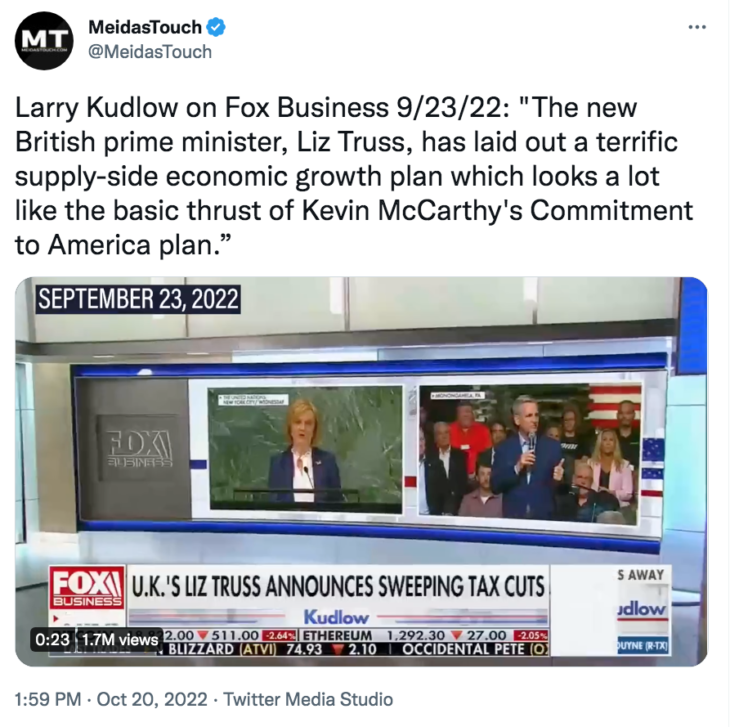
A new conservative administration takes power with a supply side agenda:
- Corporate tax cuts
- Deregulation in areas such as energy production
Six years later, another conservative administration takes office with an even more pro-growth agenda:
- Corporate tax cuts
- Deregulation in areas such as energy production
- YIMBY policies to encourage home building
- More high skilled immigration
- Seek out free trade agreements
Which is a better agenda? In the abstract, the second agenda is clearly better, more pro-growth. So why was the first agenda (adopted by Donald Trump) widely viewed as a success, while the second (Liz Truss) was widely viewed as a disaster? I see at least two factors:
- Timing: When Donald Trump was elected, the US fiscal situation was much less dire that the one faced by Truss in 2022. Britain’s national debt had risen to a relatively high level, and her proposed tax cuts and energy subsidies would have pushed the budget even more deeply into deficit. And this was occurring at a time when interest rates were rising throughout much of the world. As a result, Truss’s tax and spending proposals spooked the bond market, causing interest rates to rise even further and pushing the pound toward record lows.
- Politics: Congress was willing to pass many of Trump’s key economic proposals (apart from repealing Obamacare). Truss faced a great deal of resistance to her supply side reforms, with reports that even Conservative MPs would balk at ideas such as encouraging more homebuilding and allowing fracking to boost energy production.
The truth is that luck plays a big role in politics. Most leaders are only partly responsible for the state of the economy during their tenure. Truss’s policies might have been quite successful if adopted in a different time and place. The best way to look good is to inherit a depressed economy where stimulus is both politically popular and economically desirable (recall FDR). The worst situation for a new administration is to inherit an overheated economy where unpopular contractionary policies are necessary (Reagan).
PS. This tweet helps to illustrate my point:

Ouch!

READER COMMENTS
Thomas Lee Hutcheson
Oct 25 2022 at 12:02pm
But neither could be considered pro growth if the tax cuts lead to revenue reductions. The point is to replace high deadweight loss taxes (business taxes and wage taxes) with lower deadweight loss taxes (progressive consumption taxes, VAT, taxation of net CO2 emissions) to close the structural deficit. neither Trump/Paul Ryan nor Truss had that in mind.
Jose Pablo
Oct 25 2022 at 3:37pm
“The point is to replace high deadweight loss taxes (business taxes and wage taxes) with lower deadweight loss taxes (progressive consumption taxes, VAT, taxation of net CO2 emissions) to close the structural deficit.”
Why is this “the point”? Whose “point” is this?
There are much better ways to “close the structural deficit” from a pro-growth perspective (if it should be closed at all).
And that is from a supply side economics perspective. From a moral standpoint the case for the existence of a universal “point” is even weaker. Quoting Huemer in The Problem of Political Authority:
“the defender of taxation must hold that the state, rather than the taxpayers, is justly entitled to the tax revenues that the state collects. There is no plausible way to defend this view unless one assumes a doctrine of political authority”
But the “doctrine of political authority” you are assuming in your “point” is your own normative position. Despite the countless efforts to establish a positive base to defend the existence of a “political authority”, none of them can resist a critical analysis.
I think that to say “my point is …” would be much more appropiate than to say “the point is”
Thomas Lee Hutcheson
Oct 26 2022 at 8:19am
Sure, I’ll happily amend this to include reducing public expenditures with NPV<1.
Jose Pablo
Oct 26 2022 at 2:32pm
Is there any other kind out there?
“Expenditures” with NPV > 1 are enthusiastically addressed by private greedy agents (private agents call them “investments”, which is an appealing twist, to say the least)
The only options left to governments are the one requiring some creative accounting of externalities (and other unicorns of the same kind) to get to the > 1 “status”.
And even if they were able to find this kind of “ex-ante” NPV> 1 opportunities, the government agents will manage the day to day so badly that all these promising opportunities will end up being actual NPV < 1 endeavors … except for some of the government officials involved at an “individual level”, of course.
Incentives are very powerful indeed.
Thomas Lee Hutcheson
Oct 30 2022 at 6:38am
Given your perfectly utopian view of markets and perfectly dystopian view of government there would not be any other kind. But in the utopian view of markets there can be no externalities and no price rigidities that lead to unemployed resources. I see less perfection on both fronts.
vince
Oct 31 2022 at 2:08pm
“I see less perfection on both fronts.”
Sure, but isn’t one less perfect than the other?
Mark Brady
Oct 25 2022 at 7:06pm
“But neither could be considered pro growth if the tax cuts lead to revenue reductions. The point is to replace high deadweight loss taxes (business taxes and wage taxes) with lower deadweight loss taxes (progressive consumption taxes, VAT, taxation of net CO2 emissions) to close the structural deficit. [N]either Trump/Paul Ryan nor Truss had that in mind.”
Two thoughts.
1. The lowest deadweight loss tax is a tax on the site value of land.
2. To the extent to which income is consumed, a progressive consumption tax is similar to a progressive income tax, and a value-added tax is similar to a flat tax.
Thomas Lee Hutcheson
Oct 26 2022 at 8:25am
I agree. I’d like to make the income tax more like a consumption tax by adding more incentives for saving. I agree that one could in principle engineer changes to the income tax to make it mimic a VAT, but I think a clean substitution of VAT for wage taxes would be easier. People are accustomed to a dedicated tax for the social safety net.
robc
Oct 27 2022 at 12:11pm
You just ignoring his point 1?
You don’t seem to ever acknowledge the Single Land Tax as a viable option.
Knut P. Heen
Oct 26 2022 at 11:11am
The idea that some taxes produce less deadweight loss than others may be true, but mostly the argument is based on experience. “We know that these old taxes produce problems, but these brand new taxes will not produce problems”. Forward 50 years, and we hear exactly the same story about our “new taxes”. The grass is always greener on the other side.
robc
Oct 27 2022 at 12:12pm
Single Land Tax is an old idea. And its deadweight loss is, possibly*, as low as zero.
* there are some weird theoretically arguments I dont understand. Looks zero to me.
Mark Z
Oct 25 2022 at 1:51pm
Supply side policies are probably just generally less popular in UK, where the electorate is just generally more socialistic. The US also has a much higher tolerance for deficit spending. Truss’s economic policies would likely be more popular in the US in the worst of times than in Britain in the best of times. I think Reaganism has survived more in the US, at least in public sentiment, than Thatcherism has in the UK.
Scott Sumner
Oct 25 2022 at 3:31pm
Boris Johnson got away with big deficits, but there’s only so much the bond markets will accept. The level of the debt—and its future trajectory—also matter.
Jose Pablo
Oct 25 2022 at 3:48pm
One of the main problems of Truss (if not THE main problem) was the existence of a very significant amount of unfunded defined benefit pensions liabilities in the UK.
This had forced British poorly funded pension funds to enter risky schemes that basically amounted to a significant bet on the interest rates remaining very low.
But a liability is a liability and restricts what you can do in the future. Very likely nobody was fully aware of the size of this liability “hidden” in the British financial system. But limiting it was.
I have not seen any analysis on the differences in the amount of defined benefits liabilities in the US (vs UK). But very likely you are lucky (as a prime minister) is these liabilities are hold by the government instead of by private pension funds.
Afterall is not all “liabilities” that limit your scope for “action” is only the liabilities that can be seen or, even worse, that are barely seen but can become fully evident at some point in time.
nobody.really
Oct 25 2022 at 3:49pm
Maybe you’re thinking of Thatcher? She fought inflation by increasing taxes. In contrast, I can’t recall what contractionary policies Reagan engaged in.
On the fiscal side, Reagan cut taxes and tripled the national debt–taking the US from being the world’s largest creditor nation to being the world’s largest debtor nation. The federal deficit rose from 2.5% of GDP in fiscal year 1981 to 5.7% of GDP in 1983. Total federal outlays averaged of 21.8% of GDP from 1981–88, the highest of any President from Carter through Obama.
On the monetary side, to be fair, Reagan attacked inflation by appointing Paul Volker to the Fed, and Volker ratcheted up the federal funds rate to 20% and the prime rate to 21.5%, even at the expense of incurring the public’s wrath for causing high unemployment. No, wait–Carter appointed Volker, and bore the public’s wrath. Reagan was the guy who blamed Carter for high unemployment and large deficits–and then replaced Volker with Alan Greenspan.
Face it: Reagan was a Keynesian.
And Reagan expanded the economy by pursuing a wave of deregulation. No, wait–that was mostly Carter, too.
Scott Sumner
Oct 25 2022 at 8:17pm
You should read what I wrote more carefully before commenting. You are reading into the sentence much more than is actually there. I never said Reagan did anything.
It’s a simple fact that highly unpopular contractionary monetary policies were adopted after Reagan took office. Yes, Volcker was appointed by Carter, but the contractionary monetary policy began in mid-1981. That made Reagan somewhat unpopular.
And if Reagan was a Keynesian, why did Keynesians hate his polices?
Andrew_FL
Oct 25 2022 at 5:36pm
Reagan came in in your theoretical worst situation, yet he’s viewed generally as very successful. Why do you suppose that is? Because he couldn’t be quickly ousted by his own party in 81/82?
Comments are closed.